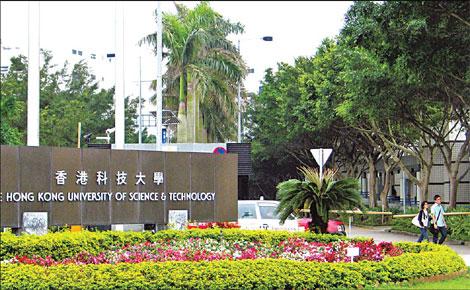
The Hong Kong University of Science and Technology, whose business school became the first from Asia to be listed as one of the top 10 in the world in the latest Financial Times MBA rankings, thanks to its program quality and research achievements. [China Foto Press]
BEIJING - The shift in the center of global economic gravity to Asia has been accelerated by the global economic downturn, a shift that is benefiting the development of Asian business schools.In the latest annual Financial Times' MBA rankings released last month, the Business School of Hong Kong University of Science and Technology (HKUST) became the first Asian school to advance to the global top 10 for its program quality and research achievements.
HKUST MBA program ranks No 9 in the world, tying with the University of Chicago, while the school's research ranks 10th, a major breakthrough for Asian schools in the history of the paper's annual rankings. It ranks No 6 in the world with a high salary percentage increase of 131 percent.
Rankings are based on alumni career progress, program diversity, theoretical leadership, research rank, the number of faculty publications in the top 40 academic and practitioner journals, and school and graduate surveys.
"The top 10 research rank proves that schools in Asia, with determination and sufficient resources, are well positioned to play a leading role in global business research. This will serve not only our students, but also business development in the region well," said Professor Leonard Cheng, dean of HKUST Business School, in an interview with China Business Weekly.
Mainland students, who usually head for the United States for their MBA education, are shifting to Hong Kong driven by more job opportunities and lower study fees.
Vicki Chen, a 29-year-old HKUST MBA student in class 2011, comes from Shanghai. Chen was a former employee of Accenture. She said access to good job opportunities in Hong Kong was a main reason for her to choose the program besides gaining more business and management knowledge.
"I want to find a job in a Hong Kong-based investment bank. Hong Kong is a financial hub where many investment banks' Asian headquarters are located," said Chen.
Wang Jian, 28, is Chen's classmate. A former IT processor from Shanghai, Wang said he has a similar goal to Chen.
"I want to find a job here, But if there are other job opportunities in big cities such as Beijing and Shanghai, I will also consider them," said Wang.
"In addition, the fee for the MBA program here is lower," he said. Wang and Chen paid HK$538,000 for the whole MBA program, almost half what they would have to pay for a similar program in the United States.
Mainland students, who mainly come from Beijing, Shanghai, Guangzhou, and Shenzhen, account for 20 percent of HKUST's MBA program at present. And almost half of MBA professors come from Hong Kong and the mainland, 20 percent from North America, 10 percent from Europe, and another 10 percent from India.
Students need to have solid undergraduate education track record, a good GMAT score and at least two years of working experience before applying for the program.
"MBA students are very programmatic. Besides achieving competent business knowledge and leadership skills, they want to find good job opportunities," said Adolf Ho, head of MBA Career Services and Corporate Relations.
A survey by the Financial Times showed that 93 percent of HKUST MBA graduates can find jobs within three months. On the salary side, their salaries three years after graduation has increased 131 percent compared to their pre-MBA salaries.
"Salaries rose by a high margin because the survey was conducted among those who graduated before the global financial crisis. This has had some effect on the employment of our business school graduates," said Professor Steven DeKrey, senior associate dean of HKUST Business School.
Graduates are now finding it much harder to find a good job, DeKrey said. To help, the HKUST MBA Career Office has also been working closely with companies in various sectors like marketing, real estate, private equity, consulting and finance in a bid to provide more employment opportunities with diversified industry coverage for MBA graduates. Workshops to enhance graduates' professional image, CV development, and networking are also provided.
The school also cooperates with world-leading consulting firm to provide students with internship and part-time employment opportunities.
"This can help students to participate in consulting services and can also help them to get to know companies via consulting services."
With a brighter economic outlook and more companies starting to recruit again this year, more job openings with better salary packages are available this year.
The school recorded an increase of 31 percent in jobs secured by their graduates until January 2010 compared to the same period last academic year, according to Ho.
"Although it is too early to conclude on the employment situation for our MBA graduates, we have so far observed an improvement in employment opportunities this year as the global economy continues to recover," said Ho.





